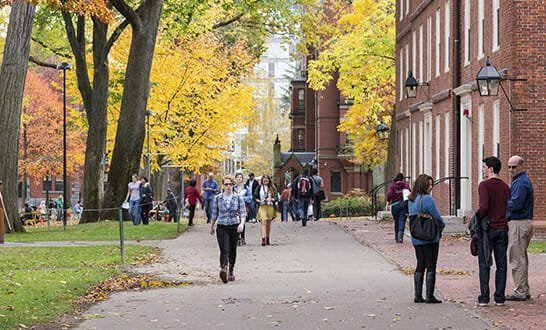
Life in a College Town
Life in a College Town
Learning hubs offer more than credit classes
By JG Walker. Previously published in the 2015 Fall Issue.

If you’re preparing to retire or relocate in the coming years, consider choosing a college town as your destination. If you’ve already got your sights set on a particular location, then find out about the universities, private colleges or technical schools that are in the area. Either way, you’ll find that the proximity of a higher-education institution offers many benefits to residents of any age.
1. Get that degree—for (almost) free. Some people graduated with a practical major like business management, but really wished they had spent more time learning about art history. A growing number of university systems and community colleges now offer tuition exemptions or discounts to students above a certain age (usually 55 or 60), or will let you audit undersized classes for free. Check with your local school admissions office for specifics.
2. Share your wisdom. On the other side of that coin, many small colleges and technical schools now employ “adjunct instructors” to teach in specialized areas. Your expertise may be related to your occupation (like marketing, accounting or legal services) or your passionate hobby (like gardening or embroidery). Don’t expect to be paid much as an adjunct faculty member, but you may find a greater value in the self-satisfaction of sharing your experience and knowledge with others.
3. Find like-minded friends. If you’re a new resident in a town, you may find that this is a good way to meet people with similar interests. So if you’re an American history buff or always wanted to learn to speak French, one great way to find new friends is to take a college class. Chances are you’ll see other students of similar age in the room; strike up an after-class conversation or extend an invitation for coffee and it might be the beginning of a beautiful friendship.
4. Lectures, readings, concerts and plays. Most colleges sponsor guest lecturer series or invite authors to read from and discuss their latest works. Likewise, many schools offer musical performances by students, faculty members or visiting artists and nearly all have a theater department. Lectures, readings and recitals are often free, while ticket prices for concerts and plays are very reasonable.
5. Healthcare access. Most major universities in big cities have medical schools to train the next generation of doctors, dentists and nurses. However, some of those institutions are located in more modest-sized municipalities that offer a variety of retirement/relocation options—Durham, NC (Duke University Medical Center) and Charleston, SC (Medical University of South Carolina) are but two examples. Medical schools generally have consulting specialists among their faculty members and even smaller college towns tend to attract medical professionals because of their more stable economies.
6. Public transportation availability. Many college students either don’t have a car or quickly find that on-campus parking is very limited. Thus, it’s not surprising to find that college towns usually have better-than-average access to public transportation. While most cities in the South and West don’t have subway systems, a growing number have above-ground rail networks like MARTA in Atlanta. But nearly all college towns have a good bus system to get off-campus students to their classes—a real boon for anyone who would rather ride than drive. And if you’re an Uber user, chances are that your driver will be a college student looking to make a little extra money.
7. Volunteer opportunities. Many colleges and universities have community-outreach programs designed to encourage public service as part of their students’ overall education. Most welcome volunteers from the communities they serve, especially those with knowledge or skills related to the program.
8. Take a safe stroll. Getting out for a brisk walk several times a week has numerous physical and mental benefits. There’s always a safe stroll available at your local college campus. Many schools have green spaces with trails and nearly all have good sidewalks that connect their facilities. Most importantly, colleges have on-site security and cameras that are monitored by staff personnel, making college campuses among the safest locations in any town.
Receive your complimentary Relocation guide and magazine


